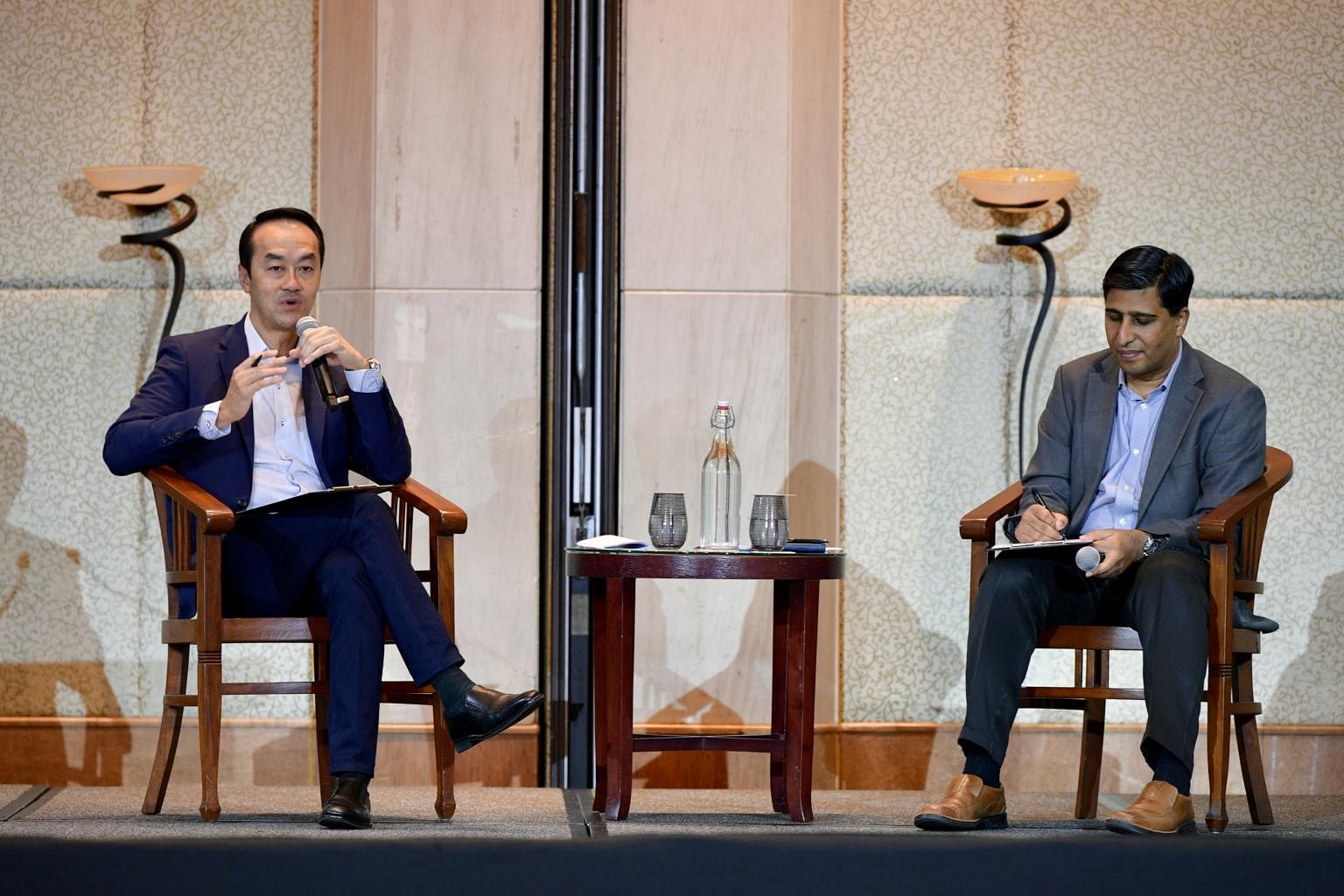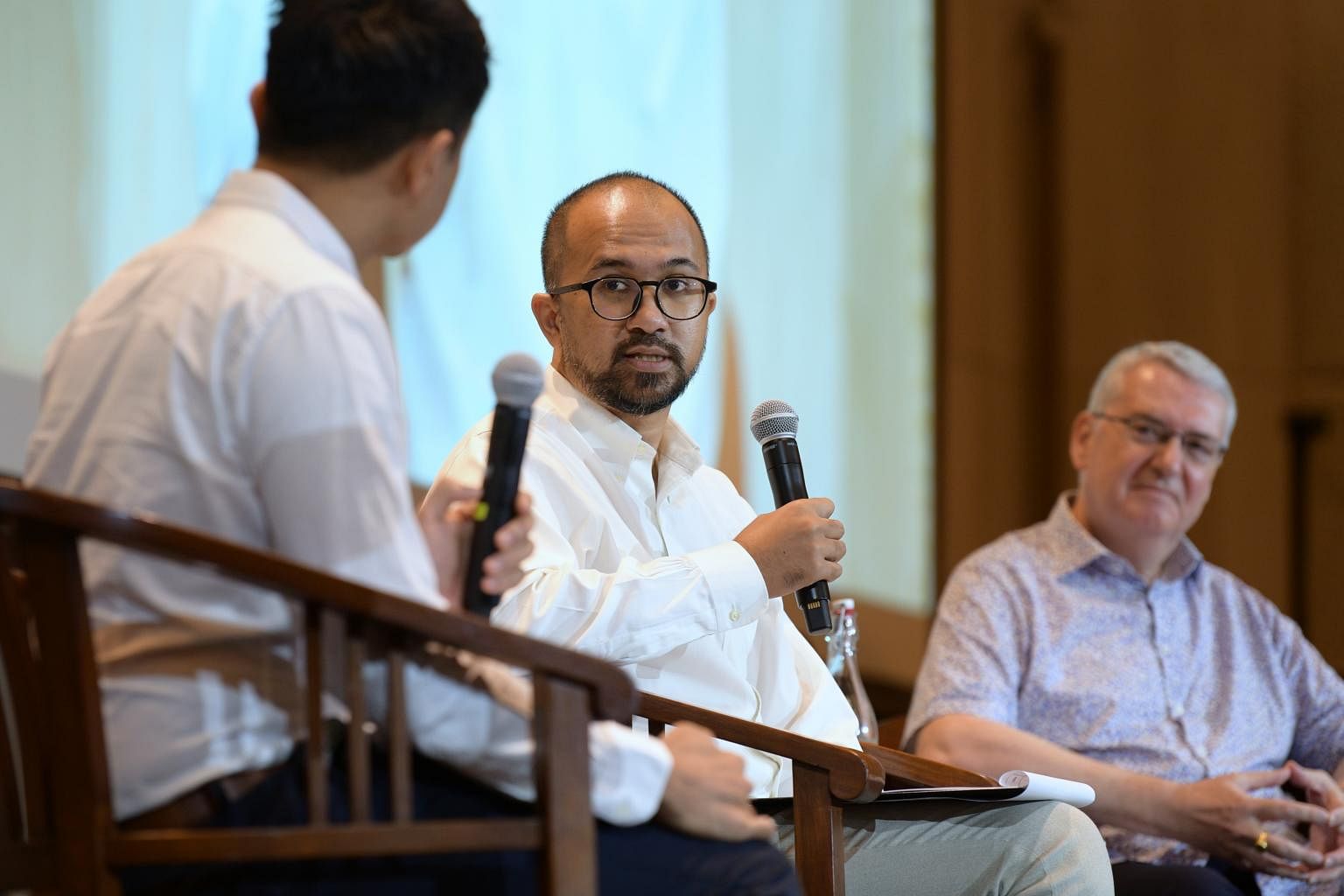"Nowadays young people are not going to put up with discrimination, and that is entirely a good thing."


Singapore has been making policy moves to take workplace discrimination to task.
Ng Wei Kai
SINGAPORE - Companies should have human resource processes in place to correct people's subconscious ethnic biases which can result in racist and discriminatory hiring practices.
They must also provide a safe environment for employees to raise grievances on issues like racial discrimination, said Ms Faith Li, who is general manager at the Tripartite Alliance for Fair and Progressive Employment Practices (Tafep).
She was speaking at a panel discussion on Saturday (May 28) at a conference on racism at the workplace called "Keeping Harmony@Work" at the Grand Copthorne Waterfront Hotel.
It was organised by OnePeople.sg, a national body which promotes racial harmony, and the Institute of Policy Studies (IPS).
About 250 religious leaders, government officials, academics and representatives from the corporate sector and non-governmental organisations attended the conference.
Also on the panel were IPS research associate Shamil Zainuddin and chief executive of the Singapore International Chamber of Commerce Victor Mills.
Ms Li added that a structured hiring process that checks applicants' abilities and skills instead of using
Senior Minister of State for Manpower Koh Poh Koon, who gave an opening address, said more can be done.
Singapore has been making policy moves to take workplace discrimination to task, he said.
During last year's National Day Rally, Prime Minister Lee Hsien Loong announced that the Government will enshrine Tafep guidelines in law, to give them more teeth and expand the range of actions that can be taken against errant companies.
But legislation alone cannot solve the problem, said Dr Koh.
He said: "We want to avoid creating a litigious culture and preserve the common space at the workplace while ensuring that discrimination in any form is not tolerated.
"Therefore, tripartite partners will continue to prioritise engaging and educating employers to shape the right mindsets and practices, and resolving reported cases through mediation as far as possible."

SINGAPORE - Companies should have human resource processes in place to correct people's subconscious ethnic biases which can result in racist and discriminatory hiring practices.
They must also provide a safe environment for employees to raise grievances on issues like racial discrimination, said Ms Faith Li, who is general manager at the Tripartite Alliance for Fair and Progressive Employment Practices (Tafep).
She was speaking at a panel discussion on Saturday (May 28) at a conference on racism at the workplace called "Keeping Harmony@Work" at the Grand Copthorne Waterfront Hotel.
It was organised by OnePeople.sg, a national body which promotes racial harmony, and the Institute of Policy Studies (IPS).
About 250 religious leaders, government officials, academics and representatives from the corporate sector and non-governmental organisations attended the conference.
Also on the panel were IPS research associate Shamil Zainuddin and chief executive of the Singapore International Chamber of Commerce Victor Mills.
Ms Li added that a structured hiring process that checks applicants' abilities and skills instead of using
Senior Minister of State for Manpower Koh Poh Koon, who gave an opening address, said more can be done.
Singapore has been making policy moves to take workplace discrimination to task, he said.
During last year's National Day Rally, Prime Minister Lee Hsien Loong announced that the Government will enshrine Tafep guidelines in law, to give them more teeth and expand the range of actions that can be taken against errant companies.
But legislation alone cannot solve the problem, said Dr Koh.
He said: "We want to avoid creating a litigious culture and preserve the common space at the workplace while ensuring that discrimination in any form is not tolerated.
"Therefore, tripartite partners will continue to prioritise engaging and educating employers to shape the right mindsets and practices, and resolving reported cases through mediation as far as possible."

Senior Minister of State for Manpower Koh Poh Koon speaking during a dialogue moderated by IPS principal research fellow Mathew Mathews at the conference.
ST PHOTO: NG SOR LUAN
IPS research from 2013 and 2019 showed that about one third of minority race respondents, including Malays and Indians, felt discriminated against at work, said IPS principal research fellow Mathew Mathews, who opened the conference with a presentation on IPS' research into trends on race and perceptions of discrimination in Singapore.
These perceptions extend to the areas of hiring and promotion.
Dr Mathews said that while most Singaporeans consider tolerance and multiculturalism to be important values, and less than 10 per cent of minorities perceive worse treatment by public services such as hospitals or schools, racial discrimination at the workplace remains an issue.
Tackling such perceptions are crucial, said Mr Shamil, adding that addressing the perception that minorities are discriminated against is just as important as addressing real instances of discrimination.

IPS research from 2013 and 2019 showed that about one third of minority race respondents, including Malays and Indians, felt discriminated against at work, said IPS principal research fellow Mathew Mathews, who opened the conference with a presentation on IPS' research into trends on race and perceptions of discrimination in Singapore.
These perceptions extend to the areas of hiring and promotion.
Dr Mathews said that while most Singaporeans consider tolerance and multiculturalism to be important values, and less than 10 per cent of minorities perceive worse treatment by public services such as hospitals or schools, racial discrimination at the workplace remains an issue.
Tackling such perceptions are crucial, said Mr Shamil, adding that addressing the perception that minorities are discriminated against is just as important as addressing real instances of discrimination.

IPS research associate Shamil Zainuddin and chief executive of the Singapore International Chamber of Commerce Victor Mills during the panel discussion.
ST PHOTO: NG SOR LUAN
The floor was open to participants after both the panel discussion and a dialogue with Dr Koh, and various concerns were raised, including that there may be no incentive to work on diversity for a profit-driven company.
Mr Mills said diversity and inclusive practices are good for bottom lines, as happy workers do their best work and these may be necessary to attract younger talent.
He added: "Nowadays young people are not going to put up with discrimination, and that is entirely a good thing."
The floor was open to participants after both the panel discussion and a dialogue with Dr Koh, and various concerns were raised, including that there may be no incentive to work on diversity for a profit-driven company.
Mr Mills said diversity and inclusive practices are good for bottom lines, as happy workers do their best work and these may be necessary to attract younger talent.
He added: "Nowadays young people are not going to put up with discrimination, and that is entirely a good thing."
No comments:
Post a Comment